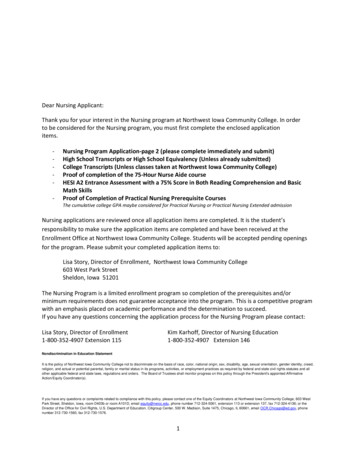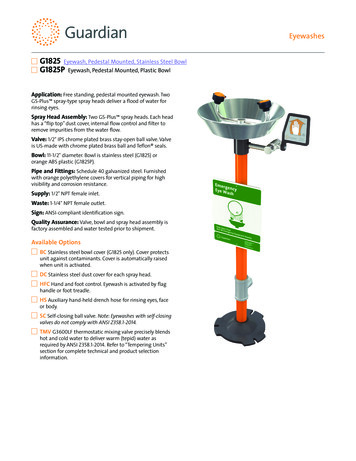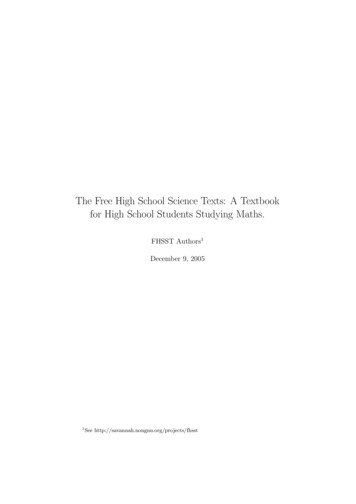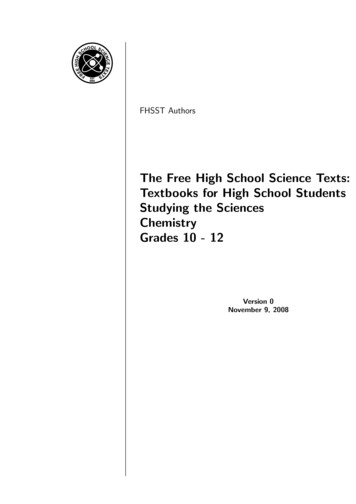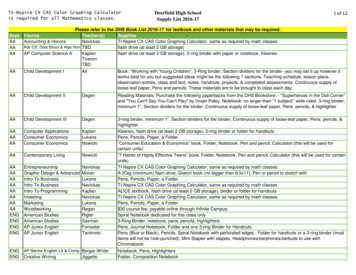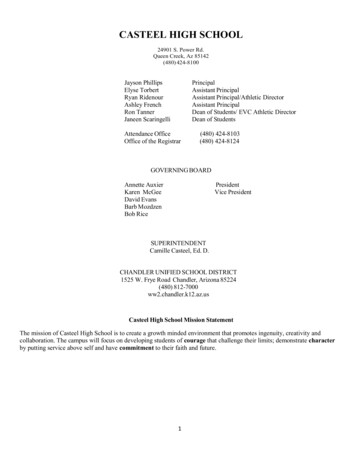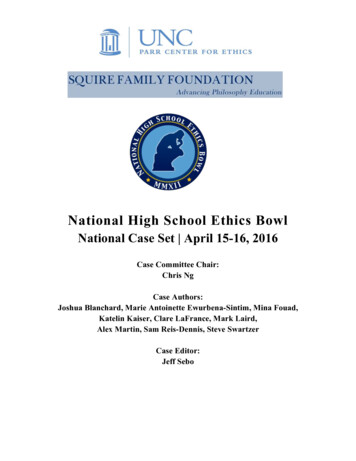
Transcription
National High School Ethics BowlNational Case Set April 15-16, 2016Case Committee Chair:Chris NgCase Authors:Joshua Blanchard, Marie Antoinette Ewurbena-Sintim, Mina Fouad,Katelin Kaiser, Clare LaFrance, Mark Laird,Alex Martin, Sam Reis-Dennis, Steve SwartzerCase Editor:Jeff Sebo
1. VT VaccineVaccines have greatly improved human health.1 Vaccines have prevented many deaths due topolio, measles, and various other illnesses. Part of their success lies in the promotion of ‘herdimmunity.’ The idea behind ‘herd immunity’ is that a population must keep a certain number of personsimmune to disease in order to protect those most vulnerable. As a result, many states require thevaccination of children before they attend public school. However, in recent years many parents havebecome concerned about whether or not the benefits of vaccination outweigh the risks. Some parentsworry that vaccines cause autism and, as a result, are deciding not to vaccinate their children. InVermont, until recently, parents could opt out of the vaccination requirement for public school studentsif they had a philosophical or religious objection. But amidst growing concern about the undermining ofherd immunity due to the large numbers of parents taking advantage of the philosophical exemption,Vermont banned the use of the philosophical (but not religious) exemption.2Proponents of the legislation cite the impact of the myriad diseases that children are susceptibleto if they are unvaccinated as a reason to require vaccination. Moreover, they say, these diseases areoften highly contagious, so opting out of vaccination increases risk not only for one’s own child, butalso for other children, including immunized children who did not develop immunity and children withcompromised immune systems due to childhood cancer and other diseases. Proponents also say thatvaccines are safe and do not cause autism, and they emphasize that the medical community has reachednear consensus on this point.Opponents of the legislation note that parents have a right to decide how to care for their ownchildren, and they argue that mandatory vaccinations violate this right. Moreover, some critics complainthat the legislation draws a distinction between religious belief and secular belief. In the United States,before 1969, one could not avoid military service through conscientious objection unless one citedreligious belief.3 Secular opponents of mandatory vaccination contend that this legislation is unfair,insofar as it insists that one can opt out of vaccinations only on the basis of religious belief. Manysecular people hold beliefs that are central to their lives, such as a belief that it is wrong to kill or harmsomeone unnecessarily. Shouldn’t they also be allowed to refuse to participate in activities they see aswrong?Study Questions:(1) Do parents have a moral duty to vaccinate their children?(2) Does the state have a moral right to require students who attend public schools to be vaccinated?(3) Is there a morally significant difference between a deeply held secular belief and a deeply heldreligious p://www.oyez.org/cases/1960-1969/1969/1969 762
2. Prison WorkThe United States has the highest rate of incarceration of any country in the world. In the UnitedStates over 1.6 million people are in prison.1 Many states make use of work prisons. In these facilities,prisoners process foods, manufacture products, engage in hard labor, and more. These prisonersvolunteer to work and then receive a wage. The Constitution prohibits cruel and unusual punishment,but it also permits indentured servitude if it is part of punishment for a crime.Opponents of private work prisons often compare them to slavery.2 They argue that prison isinherently coercive, and that prisoners cannot really freely choose to work if their only other option isisolation. Many opponents also argue that private work prisons exploit prisoners since prisoners are notpermitted to unionize, are often paid less than a dollar per hour, and are unable to earn a profit from theirlabor3. Moreover, since prison workers earn much less than non-prison workers, some opponents alsoworry that the use of private work prisons will mean that fewer jobs are available to non-prisonerworkers.Advocates of private work prisons point out that by working during their imprisonment,convicted offenders gain skills that can improve their chances of gaining employment after they returnto their communities. Advocates also argue that working helps inmates escape boredom and improvestheir mood and morale. Additionally, advocates argue that private work prisons can reduce the high costof the criminal justice system, and the burden on state budgets.Another important factor is that over sixty percent of male prisoners are Black or Hispanic4.These populations remain economically disadvantaged – in part, in the case of Black prisoners, becauseof the history and legacy of American slavery – and this background context makes questions about thenegative and/or positive impacts of work prisons even more pressing.Study Questions:(1) If prisons give prisoners a choice between work and isolation, is this really a free choice or is it acoerced choice? And what, if anything, follows about the moral permissibility of this practice?(2) Is it ethical for a private company to pay workers in prison less than workers outside prison? Why orwhy not?(3) Is it ethical for a private company to earn a profit from prison labor? Why or why p://www.huffingtonpost.com/2012/12/10/prison-labor n ex/prisonlabor.html2
3. Religion at the HospitalBetsy is an emergency room physician, and one of her patients, Steve, is probably going to die inthe next day or so. Betsy is an evangelical Christian who believes that unless people have faith in Jesus,they will suffer eternal damnation. Betsy has good reason to believe that Steve is not religious in anyway.The hospital has a strict rule against medical professionals trying to spread their faith amongtheir patients. One argument for this rule is that medical professionals are in positions of power andinfluence over their patients, who are in many cases captive audiences. Hence, using this position forpersonal religious purposes seems to constitute an abuse of power.However, if Betsy’s religious beliefs are true, then Steve’s eternal wellbeing depends on himcoming to have a specific religious faith. On the basis of these beliefs, she reasons that the importance ofSteve’s eternal wellbeing far outweighs the importance of hospital rules, her own job, or Steve’swillingness to be proselytized – after all, what could be more important than helping someone achieveeternal happiness?Study Questions:(1) How do one’s ethical beliefs relate to one’s professional obligations? When, if ever, do the formertrump the latter?(2) When, if ever, is it appropriate for a person with power and influence over others to try to spreadtheir beliefs and values to these other individuals? Explain.(3) How, if at all, would the case be different if Steve expressed interest in discussing religion withBetsy?
4. Let Them Eat Cake?Many religious institutions conceive of marriage as a relationship between one man and onewoman, and they will only support and bless marriages that fit this traditional model. For example,many churches allow their property to be used only for those events of which they approve.Recently the United States Supreme Court ruled that same-sex couples have the right to getmarried.1 Many social conservatives worry that this ruling constitutes a threat to religious freedom,since, they think, religious organizations should have a right to express and promote their own doctrineregarding sexual orientation.2 As a result, law professor Mark Movsesian predicts, “There will be manychallenges to religious institutions that continue to hold to a traditional understanding of marriage—religious adoption agencies that place children only with opposite-sex couples, religious universities thatdecline to provide housing for same-sex married couples, and so on.”3 However, many other peoplethink that institutions supported by the government should reflect government policies regardingdiscrimination based on sexual orientation.Relatedly, many bakeries around the country, such as Sweet Cakes by Melissa in Oregon, haverefused to make wedding cakes for same-sex weddings, claiming that “their religious beliefs prohibitthem from taking part in the celebration.” The owners of Sweet Cakes have gained much financialsupport on crowdfunding websites to fight the legal battles.4 “A 2007 Oregon law protects of the right ofgays, lesbians, bisexuals and transgender people in employment, housing, and public accommodations.It provides an exemption for religious organizations, but the agency ruled that exemption does not applyto private businesses who discriminate against potential customers.”5Study Questions:(1) If a private business owner sells a product to people knowing that they plan to use it in a ceremonythat she disapproves of, does that make her complicit in this ceremony? Why or why not?(2) If a private business owner refuses to sell a product to people on the grounds that they plan to use itin a ceremony that she disapproves of, is she engaging in (morally unacceptable) discrimination? Whyor why not?(3) Is it morally acceptable for the state to permit religious organizations but not secular organizations todiscriminate against potential customers? Why or why n-gay-wedding-cake-case/2
5. Warning, Warning, Don’t Read All About It!A trigger warning is a disclaimer about potentially traumatizing material. Trigger warningsoriginated on the internet, so that people could be prepared for graphic discussion or images involvingsexual assault, military combat, and other topics that tend to induce traumatic response, especially forsurvivors with post-traumatic stress disorder (PTSD).1Recently, many students have started to demand trigger warnings in the classroom as well. Forexample, students at Columbia recently demanded that classical Greek works such as Metamorphosescome with a warning about content involving rape.2 In some cases, students are also demanding thatcertain sensitive content not be addressed at all, at least in certain contexts. For example, students atHarvard recently asked that material on rape law not only come with a trigger warning but also not beincluded on exams. Many students also advise other students not to feel pressure to attend classdiscussions about material that might be triggering for them.3Critics of trigger warnings claim that they threaten free speech as well as higher education itself.4In particular, they claim that part of the role of higher education is to train students to challenge theirbeliefs and values – a process that can often be uncomfortable – and that trigger warnings conflict withthis aim. They also claim that trigger warnings shelter students, making them hypersensitive andunprepared for the real world, which will not protect their feelings at every turn. This is especially truefor students training for certain professions, such as law enforcement, medicine, or social work, wherean ability to deal with potentially triggering material on a routine basis is often essential for success onthe job.However, supporters of trigger warnings argue that these concerns are exaggerated.5 They claimthat, while part of the role of higher education is to train students to challenge their beliefs and values,another part of the role of higher education is to create a safe, supportive environment in which studentscan do so as effectively as possible – an aim which trigger warnings help us to achieve. Relatedly,supporters also claim that trigger warnings do not shelter students so much as provide them with a quick“heads up” about potentially triggering material, so that they can prepare themselves to engage with thismaterial in a productive way. Thus, supporters of trigger warnings argue, if anything it would be unfairnot to provide trigger warnings in higher education, given that many students would experience traumaunnecessarily, and would therefore be set back in their education unnecessarily, without them.Study Questions:(1) When, if ever, do teachers have a moral obligation to warn students about potentially triggeringmaterial, and why?(2) When, if ever, do teachers have a moral obligation to not include potentially triggering material onexams, and why?(3) Is there a difference between the use of trigger warnings on the internet and the use of triggerwarnings in education? Why or why gger-warnings.html? r 02
6. Family SecretsWhen Sybil picked up the phone, it was the first time that she had heard from her older sisterEdith in more than five years. But Sybil had been expecting this call—her memoir just hit the New YorkTimes Best Seller list, and she knew that Edit
of the criminal justice system, and the burden on state budgets. . woman, and they will only support and bless marriages that fit this traditional model. For example, many churches allow their property to be used only for those events of which they approve. Recently the United States Supreme Court ruled that same-sex couples have the right to get married.1 Many social conservatives worry .

